At dawn last August 22, five North Texans piled into a Honda Civic and headed south to the Capitol in Austin for a public hearing on the state’s energy agency. They were one carload among many from across Texas. Residents had waited six years for the Sunset Advisory Commission to successfully review the powerful, misnamed Texas Railroad Commission (TRC), whose official yet glaringly contradictory mission is to both promote and regulate the oil-and-gas industry. Gas utility rates, surface uranium and coal mining, and pipeline safety are also under the agency’s purview.
That August morning, it was the third time since 2010 to review the TRC’s performance. The previous two were proven unsuccessful for a variety of reasons.
More than 130 Texas agencies are reviewed by the Sunset commission, usually every 12 years. The goal is to identify and eliminate waste, duplication, and inefficiency. Commission staffers independently research the agency and write their findings in a draft Sunset Report. This is followed by public comment and a hearing before the 12 Sunset commissioners. The 10 political appointees from the Legislature and two from the public decide which recommendations make it into the final Sunset Report, a document that advises the Legislature on improvements to and reauthorization of the agency — or its expiration, hence “sunset.” These recommendations potentially become new law. Or not.
In 2011 and 2013, state legislators failed to vote the TRC recommendations into law. Sunset staff had advised major reforms.
“2011, that was a good Sunset review,” said former Rep. Lon Burnam wistfully in a recent interview.
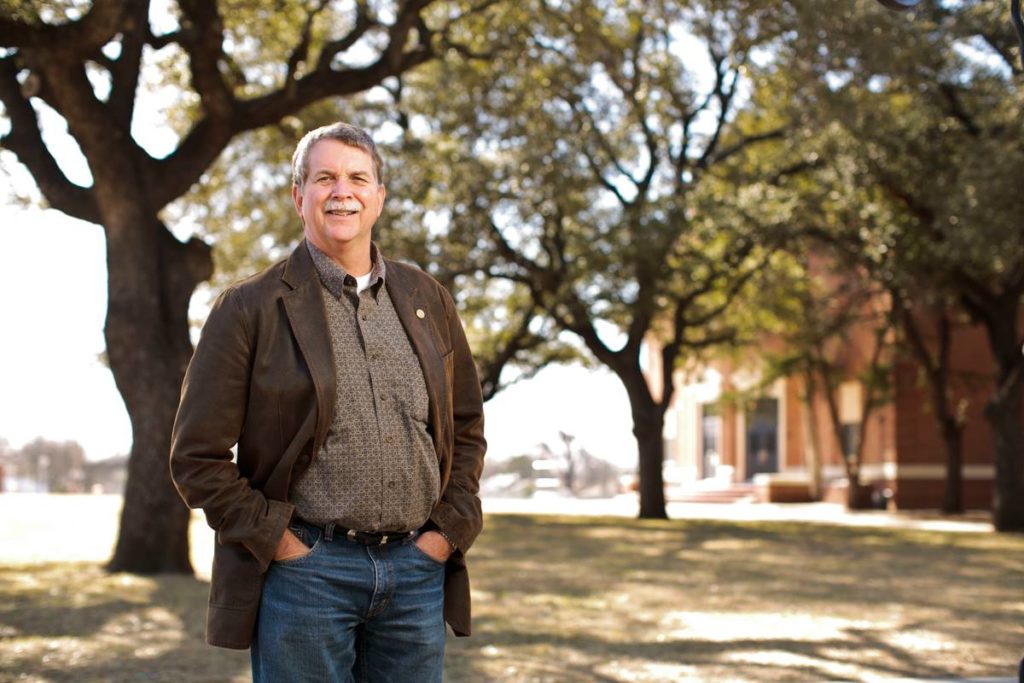
In it, the Sunset staff called for: changing the TRC leadership from elected-commissioner positions to appointees, changing its name, and shifting the agency’s reliance for half its funding from the state’s General Revenue to the industry itself, as other agencies are financed. The agenda also included tougher enforcement of violations, published online and better tracked. That bill failed to pass. A separate bill, for only the agency’s continuation to 2013 and a second Sunset review, succeeded.
In 2013, a set of even more thorough improvements from the Sunset Advisory Commission bit the dust.
“The Senate passed this bill intact, but ultimately the bill was left pending in the House Energy Resources Committee,” as Sunset staff reported.
“Left pending” means allowed to expire without action.
This time, only two measures passed: the continuation of the agency until 2017 and a bill requiring that a Railroad Commissioner running for another elected office resign –– which the governor vetoed.
The 2015 Legislature directed a full review for 2017. Sunset staffers analyzed the agency’s performance and completed their draft Sunset Report, posting it for comment, in April 2016. All interested parties finally got a new chance to weigh in
Now the Sunset Commissioners have had their say, and as of May 8, legislators have only 20 days left to reauthorize the agency to operate and finally make changes stick. What about the recommended improvements?
As those traveling to the assembly knew, residents of the Barnett Shale had experienced not only an oil-and-gas boom ushered in by modern hydraulic fracture drilling but also the undesired fallout. Shale dwellers lived with the glare, noise, fumes, and heavy truck traffic of heavy industry. Flares burning off excess gas, explosions, spills, and leaks occurred in backyards and close to schools, churches, and hospitals, into the air, the soil, and sometimes the water.
City dwellers were alarmed by the poor air quality. In 2015, Fort Worth-Dallas had passed Houston for the highest lung-damaging ozone levels in the state. The emissions that form ozone measured higher near oil-and-gas facilities, as found by research scientists at the University of North Texas using the state’s own monitoring data.
Rural people were also distraught over leaks into their family water wells. Texas municipalities had for 125 years possessed the power to address potential hazards within their boundaries by setting ordinances. In late 2015, this had been slashed by House Bill 40. Now the TRC was residents’ only resort.
Concerned whether the agency was doing its job, a public health nurse from Fort Worth, two Sierra Club members, a reporter, and the director of a clean elections watchdog group had woken up at 4 a.m. to trek to Austin. Conversation ranged from earthquakes and 1,000-year floods to campaign funding and pipelines.
Oil-and-gas operators, industry-group leaders and lobbyists, mineral rights owners, and ranchers were also making the trip. Written industry comment from the oil-and-gas industry so far opposed six of nine provisions within the report’s proposals.
For industry, summer of 2016 had shown improvement after two bust years. The year before had been sharply downhill for oil prices, continuing a long fall for shale gas since its roaring 2008 peak. By mid-April 2016, the Barnett Shale that in October 2008 had fielded 200 drilling rigs had lost its last one, according to the weekly industry report RigData.com. In the Permian Basin, oil production in the summer of ’16 was on its way to “exploding” upward, as a Forbes contributor put it, and gas was rebounding, with rig counts up and prices higher than in the spring.
The Eagle Ford Shale of South Texas was still in an oil slump but next behind the Permian in gas production. However, in 2106, bankruptcy filings from the 2014-2015 bust hit hard. By June, 43 Texas companies showed up on the bankruptcy filings list of Haynes and Boone, a law firm serving the industry.
“We’d had explosive production and extraordinary success at extracting oil and gas from tight rock formations, and we flooded the market with oil and gas,” said Karr Ingham, petroleum economist for the Texas Alliance of Energy Producers, an association of some 3,000 independent producers. “Texas tripled its crude oil production in five years. With the glut, prices fell from July 2014 to February 2016 [by] roughly 80 percent. It killed everybody –– hard on large companies the same as small, having to cut expenses and laying off people.”
The industry bristled at any changes that might cost money. Operators, industry associations, and lobbyists came to Austin to argue mostly for the Railroad Commission’s status quo.
The biggest oil-and-gas industry in the United States carried a lot of weight. It had contributed $2.02 trillion to the Texas economy in 2014, which was 14 percent of the gross state product, according to Texas A&M research economist Luis Torres. What else that kind of money might buy was an unacknowledged undercurrent at the hearing.
What would happen to the regulatory agency over the world’s sixth-largest oil-and-gas economy when it went in for an overhaul? Or would it just get a new license to operate?
That’s still unfolding now, with the 85th Texas Legislature roaring to a close. Public health and safety as well as water and air quality are at high risk, said Burnam, who is now president of the Tarrant Coalition for Environmental Awareness, an umbrella organization for enviro groups in Fort Worth. After 20-plus years in the lege as an unabashed, in-your-face liberal, Burnam ran for Railroad Commissioner in 2014-2015, lost, and re-emerged, working for grassroots democracy and environmental health and safety, the same as if he were still in office. In a state whose environmental agencies historically falter in compliance with the Clean Air Act, Clean Water Act, and other environmental laws unless pressured by the feds, President Trump’s policy reversals alarm scientists, environmentalists, and affected communities. Massive cuts to the Environmental Protection Agency, wholesale regulation removal across industries, and Trump’s choice for EPA director, Jeff Pruitt, the Oklahoma attorney general who made a career of suing the agency, all raise alarm.
“It’s a bad situation,” Burnam said. “For the last eight years, we depended on the federal government to defend us from the negligence of state government. Now we’re ‘fracked.’ ”
Entering the Capitol, travelers to the hearing found themselves in a Victorian splendor of bright spaces finished in native materials: terrazzo-floored, white-walled corridors lined with hand-carved oak doors and wainscoting and historic art. Standing in the four-story Italianate rotunda with its circular viewing mezzanine and ornate dome far above was like being inside a Faberge egg. The Capitol was completed in 1888, three years before the Legislature created the Railroad Commission of Texas to regulate railroads, such as the one that brought the building’s pink granite from Llano to Austin. Railroads were dropped from the agency’s purview in 1984, but the name is still defended like the Alamo.
In a waiting room, a crowd of 60 or more hearing attendees mulled over the Sunset Report’s findings and prepared their testimony. Stocky, kindly faced Tom “Smitty” Smith, Texas director of the public advocacy group Public Citizen, announced the room numbers of both a sandwich buffet and the hearing. Smith, easily mistaken for a Texas rancher in jeans and boots most days, had put on a dark suit to testify.
The Sunset Report went down harder than the catered sandwiches. Attendees learned that there were 433,000 wells in Texas at the end of 2015, 78 percent of them actively operating but with only 158 field inspectors. That meant the well-to-inspector ratio for active wells alone was more than 2,100 to one. Two-thirds of leases, including oil leases with thousands of wells, had not been inspected in more than two years.
“My neighbor has oil wells,” a West Texan said later. “He checks them every day to make sure nothing’s leaking. How are 158 inspectors going to check a third of a million wells even once a month?”
Five of eight other producing states show more frequent and/or more thorough inspection than Texas, reported a study of oil-and-gas regulations by Public Citizen, submitted as a written comment.
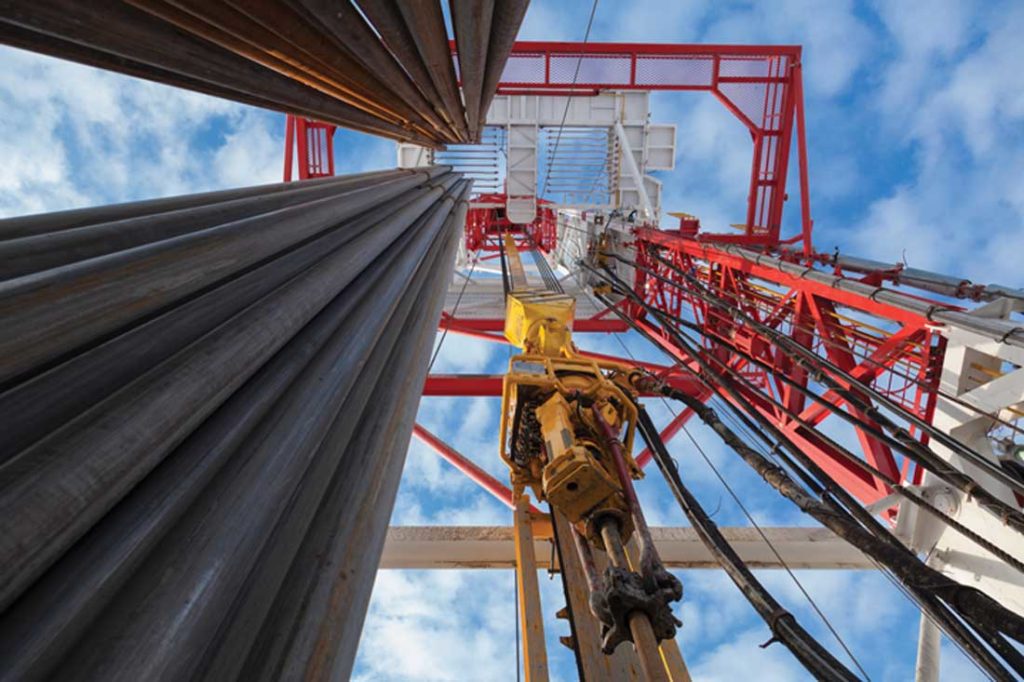 The Sunset Report identified seven issues, five of which directly affect residents in unpalatable ways, and urged solutions.
The Sunset Report identified seven issues, five of which directly affect residents in unpalatable ways, and urged solutions.
1.) Transparency was “lacking.” “The agency’s outdated name misleads the public and continues to impede the agency’s efforts to be more transparent,” the report said, adding that “Texas Energy Resources Commission” would better reflect what the agency actually does.
2.) Fairness and independence of hearings were “clouded” by “ongoing ex parte concerns,” that is, one party speaking informally to the judge outside the hearing, and by “the commission’s in-house judges’ lack of independence.” Recommended: TRC’s hearings of contested oil-and-gas permit cases should be moved to the State Office of Administrative Hearings (SOAH), which administers hearings for 60 other agencies. Contested gas utility rate cases should go to the Public Utility Commission, regulator for every utility other than natural gas.
3.) Oil-and-gas monitoring, enforcement, and reporting “fall short.” The agency “continues to struggle to provide reliable data” to show its effectiveness, including number of severe violations, the percentage of repeats, and the number of operators whose severe violations meet no enforcement. The limited information showed “commission actions have little deterrent effect,” and the main enforcement tool, severing a mineral lease to shut down production, isn’t adequately checked for compliance. Recommended: Develop a strategic plan to correct this and annually report violation numbers and repeat violations on TRC’s website.
4.) Insufficient bonding contributed to a funding shortfall to close Texas’ 9,715 abandoned wells. Financial bonds from operators to help cover well-plugging and site remediation in case of bankruptcy are required by law. In 2015, bond revenue covered just 15.9 percent of the annual cost. Recommended: Raise the bond requirements.
5.) Texas’ pipelines, both interstate and intrastate, need oversight. Neither the federal government nor the Railroad Commission enforces damage prevention rules for interstate pipelines that stretch 46,000 miles in Texas, the report said. Recommended: Authorize the TRC to do so.
To be clear: The official draft report is not the voice of the commission as a whole. It’s the staff’s recommendations. Sunset’s full-time staffers do their due diligence in evaluating an agency. The politically appointed Sunset Commissioners can choose to overrule most or all of the recommendations or leave them as is.
Two other issue items were to include alternative dispute resolution in agency law and continue requiring the agency to report to the Legislature on its Oil and Gas Regulation and Cleanup Fund, a resource that was to come up in the hearing.
People gathered outside the main hearing room: regular folks in business-casual clothes, sleekly attired legislative aides, environmental leaders and industry lobbyists in obligatory suits and ties, and boots-and-jeans-wearing operators and cattlemen and -women. A dozen wore “I Am Texas Oil” t-shirts from a PR campaign rolled out that morning by the Texas Alliance of Energy Producers. The crowd, including some 80 people signed up to speak, spilled across three chambers.
A large bronze seal of Texas dominated the main hearing room, centered on the back wall above a heavy, curved wooden dais with two tiers of some 20 seats. Sunset Advisory Commission Chairman, Rep. Larry Gonzales, sat in the top tier under the Texas star with his fellow commissioners, looking down on the witness table and across at the waiting speakers and public.

As soon as the Sunset Report was presented by its project manager and the Sunset commission director, Railroad Commissioners Christi Craddick, Ryan Sitton, and outgoing Chair David Porter were called. Dressed in her trademark red, Craddick, the daughter of powerful and controversial past Speaker of the House Tom Craddick, led off. Speaking to Sunset’s Issue No. 3, better monitoring and enforcement, she confirmed the value of accurately tracking and annually reporting the number of oil-and-gas violations as well as repeat violations, but she pleaded lack of funds to comply. To upgrade IT capabilities, she said, so that more of their enforcement data are “brought online where the public can see [them] … we estimate would cost $15 to $20 million.”
She appealed for appropriations from the Legislature.
“We want to go further than that,” testified Laura Buchanan of the Texas Land and Minerals Association, a nonprofit that advocates for rights of land and mineral owners. “We want to see online complaint tracking. Now landowners are left in the dark on the disposition of their issues. We want noncompliance by operators to be reported.”
A rancher soon seconded this, saying she could get no follow-up information on her complaint to TRC. “It just went down a dark hole.”
Pointed questioning arose around Issue No. 2, hearing fairness, and Sunset’s recommendation to transfer hearings to independent agencies. These include hearings of contested permit cases, when operators request a variance from the rules or residents contest a drilling permit. This was the third attempt in six years to move contested cases to SOAH.
The president of Texas Oil and Gas Association, a trade association of 5,000 members, including small independents and major producers, argued against the recommendation. “Moving contested case hearings to SOAH and away from the commission provides no enhanced consumer protections of any kind, whatsoever,” Todd Staples said. “Moving the hearings totally dismantles the current regulatory structure that is protecting the environment and has made Texas the best state to do business.”
Sunset Report project manager Amy Trost was hard put to answer Sunset Commissioners’ questions on hearing efficiency and the number of TRC judgments appealed to district court. “There’s no data from the Railroad Commission to show their hearings are efficient because they keep so little data,” she replied.
The three Railroad Commissioners did not comment. Craddick later cited a numeric breakdown of 2016 cases, protested and not, evidently not previously available to Sunset staff or the public.
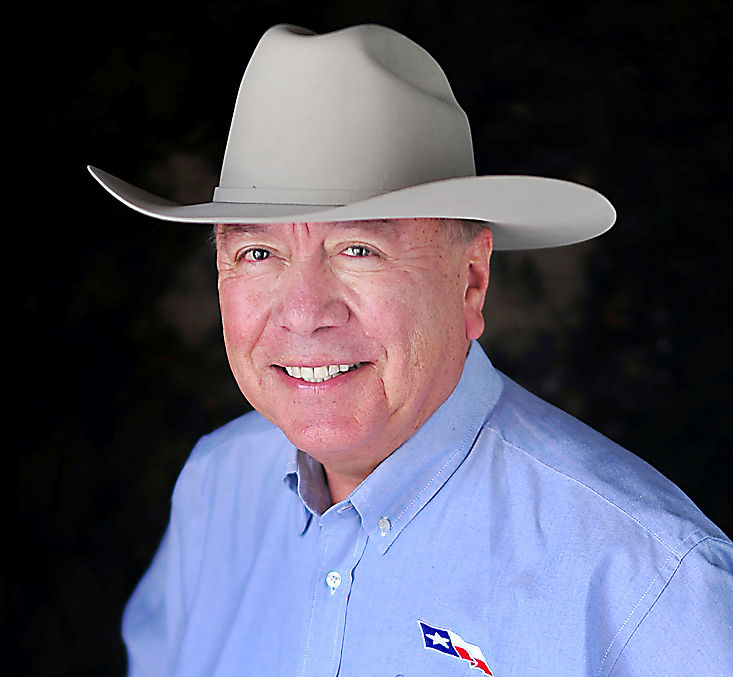
“What keeps the Railroad Commission from doing [site] remediation over the years,” said Sunset Commissioner Juan “Chuy” Hinojosa, “is, they reverse orders by their own administrative law judges without any supporting documentation. The issue I got from the general public, in perception at least, is hearings aren’t impartial.”
“I don’t know that we overturn many [administrative law judge] decisions,” Craddick ventured.
Current law, it turned out, restricts campaign contributions to Railroad Commissioners only for the period from 30 days before a legislative session convenes until the 20th day after final adjournment. Counting the five-month legislative sessions that convene every other year, contributions are banned for less than seven months out of 24.
At the Sunset hearing, when David Jones said, “Let’s talk about our biggest problem, conflict of interest and campaign finance,” the audience fell silent. The director of campaign-finance nonprofit Clean Elections Texas continued, “regulation is supposed to be impartial. We’ve seen oil-and-gas very pleased with Railroad Commission performance. But lots of people in Texas don’t own wells or work for oil and gas. Christi Craddick received 81 percent of her [2012] campaign funds from the oil-and-gas industry. This commission should be concerned.”
Craddick’s 2012 donations cited by Jones amounted to more than $2.8 million, according to Texas Ethics Commission records cited by Texans for Public Justice. The three sitting commissioners received a total of $6.7 million. Industry contributed the majority of all Railroad Commissioners’ campaign monies in the 2012 campaign and continued to do so through 2016, according to studies by both Public Citizen and Texans for Public Justice (TPJ), an Austin nonprofit that tracks money and corporate influence on Texas politics.
More came to light after the Sunset hearing. From late 2010 to 2016, commissioners had taken tens of thousands of dollars from energy interests with utility rate cases before the agency, as revealed in a March 2017 study by TPJ. Of all the rate cases contested during that period, TPJ tracked six cases involving Atmos Energy, the Houston-based company ClearPoint Energy, the Austin law firm representing both companies, Parsley Coffin Renner, and the cities whose residents would pay any requested rate increases.
TPJ found that the seven commissioners who served between December 2010 and 2016 took contributions, either after they were elected or while in office, from involved parties. They “took a total of $390,904 from the three entities that had a keen interest in the … six major rate cases pending before the commission” during that time. TPJ goes on to say that $58,968 of that amount was given while cases were pending. The study was co-authored by Public Citizen Texas and the Sierra Club Lone Star Chapter.
Commissioner Craddick received some of those funds. In response to an email and a phone call, Craddick’s director of public affairs, Lauren Spreen, replied that Craddick preferred not to comment.
In last August’s Sunset hearing, Rep. Senfronia Thompson of Houston broke into the long discussion over moving TRC hearings to ask about the 9,700 abandoned wells.
“What about wells that may have been leaking and got into the water table and caused health concerns to the community? Have you seen cases like that, and if you have … what has been your remedy?”
Craddick replied, “So when we have a well come on [the inactive well list] that is considered abandoned, we … inspect all those wells. We have today about 9,500 on our book. That sounds like a big number, but it’s smaller than it sounds. … We have five wells that are leaking or we know have environmental concern.”
“If you find that a well has contaminated the drinking water of a community, do you notify that community?”
“We work with the operator to remediate that,” Craddick said, “and they are penalized … if there’s a community, and I’m not aware of any at this time. … We would also potentially work with that community.”
Commissioner Sitton said, “I don’t think we have actually found any … that have actually shown a contaminated ground water source.”
In listeners’ hands, though, was the Sunset Report. Looking at the numbers and later at the TRC’s website, it appeared the abandoned well count might actually be more than it sounds. An afternoon’s worth of research uncovered, in North Texas alone, more than five documented cases of leaking wells investigated by the TRC; the Texas Commission on Environmental Quality (TCEQ); the EPA; and/or Earthworks, a national nonprofit that protects communities and the environment from adverse effects of mineral and energy development.
Emails and phone requests to Craddick’s office and TRC’s media office for the locations of Craddick’s five leaking wells and changes in well count rules yielded no information. TRC spokesperson Ramona Nye emailed back, saying, “We do not have anything to add to the testimony provided by the commissioners.”
Nonetheless, waiting to speak some four hours later at the hearing were 13 elderly African American residents of the Chasewood community southwest of Houston who are still living with abandoned wells, contaminated water wells, and a 36-percent cancer rate.
“One-third of the community is lost,” resident Roy Griffin said. “In 401 houses, everyone was touched by cancer over 10 years.”
For the next half-hour in a funereal hush, his neighbors one by one voiced their grief, outrage, and desperation. They have asked for help from the mayor of Houston and the local water utility but have been abandoned.
The Sunset Commissioners, to their credit, dropped their notes and side conversations with one another and their staff and listened closely.
Also waiting to speak was Lee Perry, a retired oil-and-gas analyst with a sheaf of documents showing that in 1999 and 2009, two oil wells near Chasewood were cited by the TRC. Ultimately, they had been designated Priority 1, the federal category of “serious threat to public safety and a health hazard,” which is a felony, Perry said. The agency ordered the operator to close the wells and remediate the site. Perry, who had pursued the case since 2014, testified that remediation was not done and that no enforcement action by the commission is on record.
Later that fall, the community sought options for new water tests and a full investigation.
Issues absent from the report were raised. “Action to address inadequate well inspections wasn’t included in the staff report,” pointed out Corey Troiani, North Texas director of Texas Campaign for the Environment. “The agency doesn’t have the manpower to do their jobs.”
Funding the plugging of abandoned wells, should operators go bankrupt, was a discussion overshadowed by hazards and liabilities. Sunset staff and numerous speakers cautioned of the possibility of well leaks, contamination, and massive financial and safety burdens ultimately to fall on the public if they were left unaddressed. Staff had calculated the 2015 cost to plug the current backlog at $27 million. Eighty percent of those wells predate the 1991 bonding law, according to Commissioner Sitton. This was the one issue that roused operators’ representatives, Sunset Commissioners, and the chairman of the powerful House Energy Resources Committee, Rep. Drew Darby.
Raising the bond rates operators pay to insure for well plugging if their businesses fail was a hot potato. Leaders of two independent producers’ groups, Permian Basin Petroleum Association (PBPA) and Texas Independent Producers and Royalty Owners (TIPRO), asserted that 92 percent of wells are plugged by operators. They cited 20 sources of well-plugging funds other than bonding. They pled that requiring bonds sufficient to cover wells when operators go bankrupt would be a hardship “to those at the lower end of the economic spectrum,” as Ben Shepperd of PBPA put it. No one asked whether operators without funds to post bond should be allowed to operate at public risk.
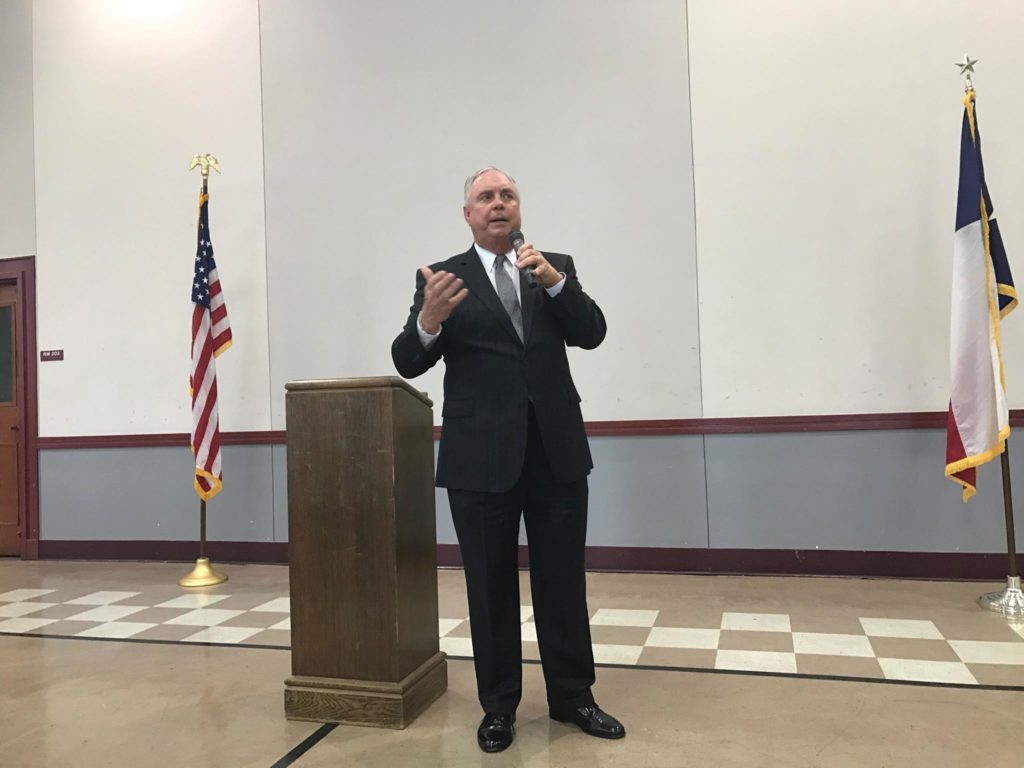
Energy Resources Chair Darby questioned if money from the Oil and Gas Regulatory and Cleanup Fund was not getting to plugging.
When the hearing ended at 8:30 that night, 76 people from all over the state had testified, including three TRC officials and two Sunset staff members. Sixty-four residents spoke in favor of the official Sunset reform recommendations and additional ones. Seven were opposed or spoke for unrelated issues.
For 60 days after the August hearing, public comment on the Sunset recommendations flowed to the Sunset Advisory Commission. Had the staff’s draft of the Sunset Report been a bushel basket of proposed actions, the public’s concerns and proposals would have filled two more.
These were to be reviewed by Sunset Commissioners before they finalized the report. On November 10, they took that vote.
At the Sunset Commissioners’ decision meeting November 10, 2016, three of five Sunset staff recommendations tracked in this article were dropped without discussion.
Evidently, this is SOP.
“What the chairman does not think there will be votes for, he doesn’t bring up,” explained Andrew Dobbs of Texas Campaign for the Environment.
Sunset Chairman Gonzales punted off the field measures to rename the agency, to move its contested permit cases and gas utility rate cases to independent agencies, and to raise bonding requirements to fund the plugging of abandoned wells.
Those weren’t in the final Sunset Report to the Legislature.
Issue 5, pipeline safety provisions, was. So was most of Issue 3, a strategic plan for monitoring and enforcement with annual reports of total numbers of violations and repeat violations.
Of seven original Sunset Report issue recommendations, only three made it through the Sunset Commissioners’ vote to the Legislature, a half-bushel.
Neither Rep. Gonzales nor staff replied to multiple emails and phone requests for comment on meeting procedure.
Now May 1, there were about 20 days for bills to cross the last hurdles in the Texas legislative process to get to a vote.
In January, when the 85th Legislature opened, an intricate, tightly timed process of hearings and votes began. Bills to reform the Railroad Commission would have to navigate successfully through a committee hearing and vote, get put on the calendar to be heard in the House or Senate and if approved there, complete steps to be scheduled and heard in the other chamber’s appropriate committee and then heard for votes on its floor.
Fifteen bills on TRC issues had been filed in House and Senate. Rep. Rafael Anchia of Dallas put back in play the agency name change and addressed three other issues brought by citizens that the Sunset Commissioners did not.
HB 464 would ban political contributions to Railroad Commissioners outside election season and contributions by individuals with issues in adjudication before TRC’s administrative court.
HB 237 would change the agency’s name to Texas Energy Resources Commission. Two other name change bills were filed.
HB 247 would expand TRC’s posting of enforcement information for public access, making data trackable and fully searchable by violation, operator, penalty, and enforcement.
HB 2932 would raise maximum fines for oil-and-gas violations.
The latter three had Senate companion bills by Sen. Jose R. Rodriguez.
The goal of bill sponsors, Cyrus Reed, Sierra Club conservation director, and others who lobby for public interest bills, was to model amendments on these bills. If they didn’t pass, perhaps the amendments would get accepted on a bill that would pass, like the Sunset Bill.
The first TRC measure to get a hearing was that official Sunset Bill (HB 1818), to reauthorize the agency, by Sunset Commission Chair Gonzales, who spoke for it before the House Energy Resources Committee March 6.
“This is the first bill we’re rolling out,” he announced to the committee and other witnesses. Reauthorization of the TRC was his one concern.
Oil-and-gas is “a commodity on the global market, where we sell our products,” he said. “That’s why it’s critically important we get this done. This is a good, solid bill void of things that kept Sunset bills bogged down. … We told stakeholders, ‘If you want those [other] issues, file a bill. File a bill because of what this means to our economy … .’ It’s important the rest of the world knows that we’ve got an agency that is doing their job.”
Of the three measures that Gonzales’ Sunset panel had approved, only pipeline safety and a strategic plan for tracking and measuring enforcement effectiveness were in the Sunset Bill.
House Energy Resources is presided over by Rep. Drew Darby, the same Drew Darby who authored HB 40 overturning local ordinances for oil-and-gas safety. Scheduling a bill to be heard in committee and the vote to potentially pass it to either chamber, the next step in the process, happen at the pleasure of the committee chair. He called for a vote, and the Sunset Bill was voted favorably and scheduled for a March 29 hearing in the House, the first legislation on Railroad Commission matters.
On May 9, the Sunset Bill passed the House. Sen. Van Taylor, a Sunset Commissioner over the TRC review, offered it for the vote. One lone Democrat, Sen. José Rodriguez, proposed an amendment to post oil and gas violations and enforcement information for public access. Taylor refused it.
The TRC campaign contribution bill, HB 464, finally got voted out of committee May 4, but it reached the House Calendars Committee too late to be scheduled for a vote by May 11, the final deadline. The bill had been held in Rep. Sarah Davis’ House Ethics and Investigations Committee for six weeks.
All the other related House bills were left pending in committees as of May 8, not reported out in time to complete the process.
In the Senate, Rodriguez’ SB 568 requiring TRC to post enforcement information finally passed out of committee. On May 16 was put on the “intent calendar” for a Senate hearing. The other four Senate bills to improve the Railroad Commission died in committee.
If SB 568 comes to a vote, it will be the only TRC reform bill to do so, of 15 that survived until May.
“For all practical purposes, all hope of meaningful reform died” with the Sunset Bill’s passage, said Burnam. “HB 1818, that was the occasion when amendments could have been offered.”
One vision of the Railroad Commission Sunset process and Texas’ future had come from the lips of newly elected Railroad Commissioner Wayne Christian when he testified on Gonzales’ bill. It showed his stance on TRC’s dual mandate to protect the environment and promote oil-and-gas. Euphoric, Christian declared, “I believe we’re on the brink of the greatest energy boom in our history! For that the Railroad Commission must have regulatory certainty.

“In the last year alone, 15 oilfields and eight gas fields were discovered in Texas. Among these was the largest oil-and-gas deposit discovered in U.S. history: 20 billion barrels of oil and 16 trillion cubic feet of natural gas, with an estimated value of $900 billion in the Permian Basin alone.
“It’s a new day in Texas,” he continued. “We have a federal administration that looks upon fossil fuel production favorably, with our former Governor Rick Perry as Energy Secretary, former Oklahoma Attorney General Jeff Pruitt as EPA director, and Texas oilman Rex Tillerson as Secretary of State.”
Christian described a golden boom with job creation for Texas families and money pouring into communities for roads and schools, if only the Sunset Bill would pass.
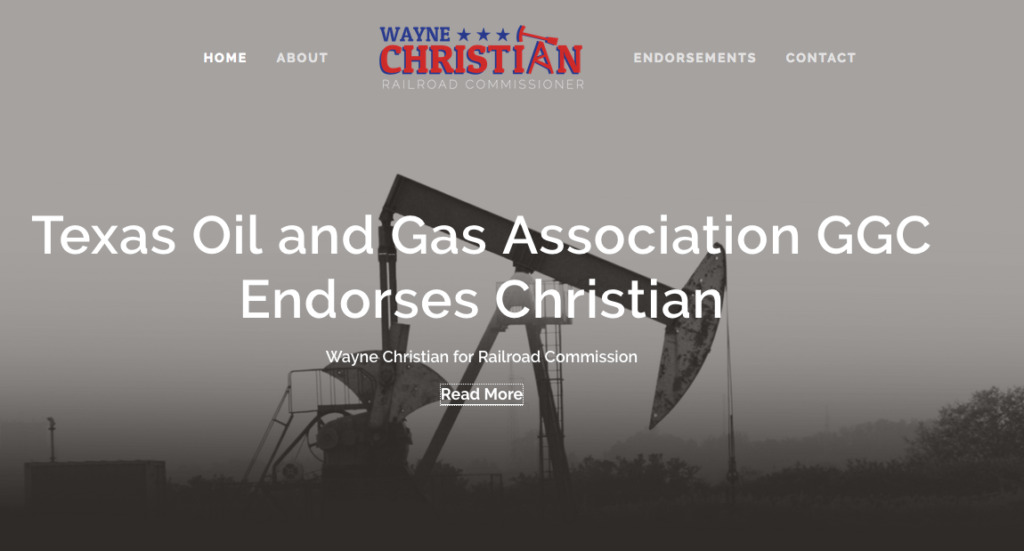 This is not the new day that the carload of travelers to last year’s public hearing wanted. Nor the 64 speakers who testified on behalf of communities from the Eagle Ford to the Gulf, the Big Bend and North Texas. With the agency continued for 12 more years, Texans’ hope for effective reform of the Texas Railroad Commission may have to wait until 2029.
This is not the new day that the carload of travelers to last year’s public hearing wanted. Nor the 64 speakers who testified on behalf of communities from the Eagle Ford to the Gulf, the Big Bend and North Texas. With the agency continued for 12 more years, Texans’ hope for effective reform of the Texas Railroad Commission may have to wait until 2029.
Reed, Burnam, and others had put their hopes on and their efforts behind a principle distilled from long experience by their colleague, Public Citizen’s Tom Smith. To a woeful volunteer who asked Smitty “What do we do now?” after the passage of House Bill 40 slammed the door on frustrated shale dwellers and made the Texas Railroad Commission their sole recourse for regulatory aid, he replied, “The only thing that speaks louder to Texas legislators than oil-and-gas money is the voices of upset constituents.”
Upset constituents were vocal during the Railroad Commission Sunset process. On April 25, carloads of voters had again wended their way to the capitol. This time they came as citizen lobbyists, along with Alliance for a Clean Texas, to get face-to-face with their elected representatives or aides and make the case for action in their interest and their neighbors’. On May 9, the House Calendars Committee was flooded with emails.
“Calendars complained they got thousands of emails asking for House Bill 464 to be scheduled for a vote,” Burnam said.
The power they brought was not money, just eyeballs and their votes.
At best, a single bill for public posting of current enforcement information may pass. Efforts to get better oversight, stronger enforcement, and accountability from the regulator fell short, yet again.
Maybe people built political muscle, though, working on the Texas Railroad Commission.
Editor’s note: This story has been updated to reflect current information.













You suffer from what we have coined as “fracking-on-the-brain” disorder. Knowing little or nothing about hydraulic fracturing, or even petroleum engineering in general, you, like so many others, have most irresponsibly spread so many myths that were created by the northeastern press, particularly the New York Times, at the beginning of the Marcellus Shale play.
There is no such thing as “hydraulic fracture drilling.” Hydraulic fracturing is a well completion process that may or may not be used *after* drilling is done. And when it is used, it may be used months, even years, after the drilling is done. Hydraulic fracturing is *not* a part of the drilling process.
Also, the “oil-and-gas boom” was *not* “ushered in by modern hydraulic fracture drilling.” It was instead “ushered in” by sky high natural gas commodities prices. Horizontal drilling and hydraulic fracturing completion were both already old technologies when the natural gas and oil booms were “ushered in.” They both could have been used in the Barnett Shale and other shales long before the booms were “ushered in.” The reason they were not used earlier was that the economics weren’t there. There are very expensive techniques. They could not be used in shales until higher natural gas and oil commodities prices made it commercially feasible to do so.
One would expect the press in the Fort Worth area to be more knowledgeable about oil and gas topics and responsible in their writings.
You point out some minor semantics in the story as examples of how the press are clueless when it comes to drilling. I guess news people should be ashamed of themselves for daring to spotlight how the industry floods lawmakers with lobbyist money to create loose laws and lazy regulation that allows drillers to run over people and pollute the earth with little or no penalty. If a reporter is stupid enough to say that the oil and gas boom was ushered in by modern techniques instead of high gas prices, well then that reporter should just jump off a bridge rather than point out how the oil and gas industry uses eminent domain to take people’s property and run pipelines across it even when other routes and pipelines are available but the various gas companies don’t want to share with each other. Hey reporter — since you didn’t know that hydraulic fracturing occurs after drilling rather than during drilling, then you should quit your job rather than point out how those same drillers have ruined people’s water wells but instead of taking responsibility they sic a team of lawyers on anyone who complains. Are your kids’ noses bleeding regularly now that a natural gas compression station was built nearby? Too bad. Billy K. Lemons says the news media shouldn’t point that out because they are too stupid. You are right Billy. Only drillers should write news stories about drilling from now on. That would surely cut down on the number of negative stories pointing out how the industry is powerful and corrupt and will run over, out-spend and out-lawyer anyone standing in their way.
Billy – the crux of your point is that laterals are well completion and are not drilling? COME ON. The old jargon has blurred now with modern techniques available.
Besides to the public – drilling is a less specific term and refers to all oil & gas downhole things. The press comes to the public in the terms they understand.
Correction: “They are very expensive techniques.”
Texas should have elected Mark Miller as the new Commissioner. Then at least someone would have been looking out for land and home owners rather than the profits of the oil companies.
Greed-heads are going to be Greed-heads….Peckerwoods are going to be Peckerwoods….what’s new here???
There is an old saying that the best way to deal with a moron or a person who responds to the communications of another without first actually reading, listening to or comprehending them is to simply say “okay” and then move on.
So then, okay.